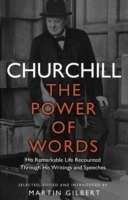Churchill: The Power of Words

Editorial Bantam
Fecha de edición mayo 2014 · Edición nº 1
Idioma inglés
EAN 9780857501462
480 páginas
Libro
encuadernado en tapa blanda
Biografía del autor
x{0026}lt;span x{0026}lt;span style='font-size:13.3333px;' ?Winston Leonard Spencer Churchill (Blenheim Castle, Oxfordshire, 1874-Londres, 1965), proveniente de una familia aristocrática victoriana, se graduó en el Royal Military College. Tras haber servido en la India, presenció la guerra anglobóer como corresponsal de guerra del periódico Morning Post. En 1900 fue elegido diputado por el Partido Conservador, que abandonó en 1904 para unirse al Partido Liberal. x{0026}lt;/span x{0026}lt;/span x{0026}lt;span x{0026}lt;span style='font-size:13.3333px;' El gran salto en su carrera política se produce en 1940, cuando es elegido primer ministro en sustitución de Neville Chamberlain. Después de perder las elecciones en 1945 contra los laboristas, recuperó la jefatura del Gobierno durante el periodo comprendido entre 1951-1955. Tras dimitir ese año, se dedicó a la pintura y la literatura, campo en el que destacó con obras como Paso a paso: del crepúsculo de la paz al resplandor de la victoria, Sangre, sudor y lágrimas, Los secretos de la guerra, Pensamientos y aventuras y Savrola. x{0026}lt;/span x{0026}lt;/span x{0026}lt;span x{0026}lt;span style='font-size:13.3333px;' En 1953 se le otorgó el premio Nobel de Literatura. x{0026}lt;/span x{0026}lt;/span x{0026}lt;p x{0026}lt;br x{0026}lt;/p x{0026}lt;/span








